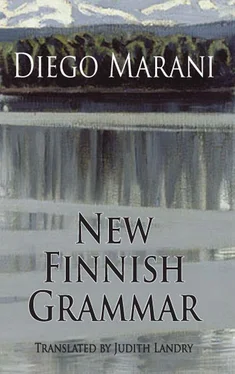It was only after the battle of Kuuterselkä, when the first wounded began to arrive back in Helsinki, that we realized what was really going on in the Karelian Isthmus. They were brought back to the city by night, so that people wouldn’t see them, in lorries driven by the medical corps. I heard them arriving, saw them going into the misty courtyard; then I started to get dressed. I stayed seated on my bed, waiting for the nurses to come and call me. In the bruised light, their bandages looked the same colour as the gravel in the courtyard. They emerged from beneath the tarpaulins like ghosts, and we shepherded them slowly into the building, helping those who were incapable of walking. We took them to the innermost wing of the hospital, the one which also housed the visitors’ quarters. They were almost all very young, more perturbed by what they had escaped than by the wounds themselves. They were unwilling to speak of life at the front, and answered the nurses’ questions in monosyllables. Many were running fevers, and for several days all that could be seen of them was their outline, standing out beneath the sheets. The others too stayed lying down, staring at the ceiling or, if they were able to get up, going into the courtyard, where they wandered around smoking cigarettes they never finished. The few veterans from the Winter War told us about the breakthrough at Valkeasaari; they said that they had never seen such aggression, that this time the Russians were really bringing out the big guns. The line of defence at Kuuterselkä, too, had been breached with the utmost ease. But how could anyone hold out against such force? Both the nurses’ questions and the soldiers’ answers suggested a shared concern, hitherto kept hidden, the nervous allusion to a place which no one dared to name. I had looked for the places I was hearing about on the map; without exception, they formed a ring around Viipuri, a circle which was closing in. People discussed the news in the papers without ever making explicit mention of the name of the great city, almost as though they thought it would bring bad luck, as though not naming it would cause the Russians to forget about its existence. In the hospital refectory the patients would gather around the soldiers returning from the Isthmus and listen carefully to what they had to say, seeking the slightest sign that the Russians were directing their attack elsewhere, that Viipuri was in the clear, and anything would serve to bear out that conviction: current rumours, letters from the front, the most abstruse strategic reflections from some returning soldier. People would reassure themselves by repeating that the capital of Karelia was too well-defended, that the Russians would never run the risk of incurring the huge losses that such an attack would incur. The Germans were retreating, Leningrad was not in danger. Why would the Russians persist in attacking Viipuri?
In the middle of June, three of the remaining beds in the visitors’ quarters were occupied, and I was no longer alone; but only for a few days, because my companions were three Russian officers who had been taken prisoner, and it was not long before they were transferred elsewhere. During their stay I listened to them curiously — their language was so different from Finnish. Pretending to study my notebook, I observed their gestures and their faces. So, that was what Russians were like. I thought of what Koskela had said, of the Uspenski Cathedral, of Ilma and her fear. The soldiers had occupied the three beds on the other side of the big room; the red-tiled floor ran between us like a frontier. They too were watching me in their turn; when they smoked, sometimes they would toss me the odd cigarette. I would nod my thanks, expressing my gratitude by lighting up immediately; then I would let them burn without actually smoking them, because they were so strong and bitter. One of the soldiers had been wounded in the foot, and moved around on crutches; the others too clearly had facial wounds, since their heads were bandaged. They stayed shut up in the room all day, with two guards watching over them from the corridor. When I came back, late at night, I would find them asleep, their uniforms neatly folded on their small iron trunks, their boots at the foot of their bed. I could see the tips of the guards’ cigarettes glowing in the corridor, and this I found somehow reassuring: it was not that I was afraid of the Russians, but I liked to think that the guards were watching over me, too, warding off the oppressive dreams which thrust themselves upon me in the loneliness of sleep. The Russians’ presence had livened up the visitors’ quarters, made them somehow more welcoming. One night, after I had managed to lay hands on a bottle of spirits at the Kämp, I went back to the hospital earlier than usual, hoping to find the Russians still awake, as indeed they were, playing a game of cards. They invited me to sit with them; I understood nothing of the game, but I looked at the gilded figures on the cards, and they reminded me of the saints in the Uspenski Cathedral. The bottle was received with hearty slaps on the back, was passed round and very soon emptied; we consoled ourselves with cigarettes, of which there was no shortage, and also devised some form of conversation, using gestures and scraps of words which we spelled out in the air. One of the three, the one with the red stripe on his tunic, even spoke a sort of bastardized Finnish: he would throw one word out on top of another, then separate them with his hands. The verbs, however complicated, he would simply mime, as though he were quite used to expressing himself in that fashion. He showed me dog-eared photographs of women and children, the shape of whose eyebrows resembled his own, taking them out of his wallet and then replacing them with the greatest care. He also tried to explain to me which Russian city he came from, with the aid of an imaginary map of Russia, drawn with one finger on the wall. I went to my trunk to get the map of Europe which Koskela had used during our lessons, the one he’d used to describe the misguided migrations made by the Finno-Ugrians; but it didn’t serve much purpose, since it stopped at the Urals. When we opened it out on the floor, the city this man came from turned out to be two tiles beyond the edge.
‘ Suuri , Russia on suuri maa! ’ he exclaimed, laughing and banging the floor with his fist. That night in June was the last time I felt the warmth of another human turned in my direction, the last time I spoke heart to heart with one of my fellow men. The next morning, when I came back from mass, I found the three beds empty, the mattresses rolled up. It seemed to me that I could still see the outline of Russia which the officer had sketched out with his finger on the wall.
Now it was a pastor from the nearby cathedral who came to say mass in the hospital chapel. But after having heard Koskela’s sermons, those of the new officiant struck me as glib and infantile; his use of language was unsubtle, his words came straight from the Mass Book, I could understand them without any difficulty, and hence heard them without interest. I offered the newcomer my help as a sacristan, but I did not seek his friendship, indeed I made sure that I kept my distance. I talked with him enough to ensure that church business went smoothly, but no more than that. Yet, despite my unresponsiveness, the new pastor showed me considerable kindness: noticing my interest in language, perhaps on the nurses’ suggestion, he gave me a new notebook, with plain white pages. But my attitude towards him remained unchanged. As I had done with Koskela, in the morning I would wash the floors and dust the holy objects, in the evening I would light the candle before the service and put away the missals at the end. But the intimacy I had established with Koskela was not something that could ever be repeated; it was the fruit of long and careful nurturing, and I had no desire to dull its memory by finding a substitute. The new pastor did not use the sacristy; he prepared his sermons elsewhere, and came into the little room just to hang up his hat. I had put Koskela’s Kalevala and the bottle of koskenkorva back into the little cupboard and sometimes, in the evening after the service, when the pastor had left, I would stay on there for a time, thinking about the past. In my hands, the bottle did not replenish itself; when I had finished it, it remained resolutely empty. But even that empty bottle served as a reminder of my old friend. I took it away, together with the Kalevala , and put it in my little trunk, as though it were a relic. The faded label and the lingering sweetish smell reminded me of my first afternoons in the sacristy, with the crackling stove and the ice on the window panes: they spoke to me of a world which now seemed infinitely far away.
Читать дальше












